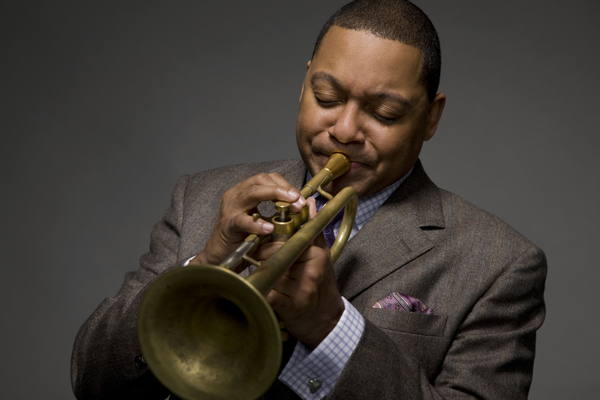Wynton Marsalis
New Orleans-born trumpeter, composer, and jazz educator Wynton Marsalis is an accomplished musician, Pulitzer Prize-winning composer, and internationally acclaimed cultural icon.

Courtesy of Wynton Marsalis Enterprises
Wynton Marsalis. Unidentified
New Orleans-born trumpeter, composer, and jazz educator Wynton Marsalis is an accomplished musician, Pulitzer Prize-winning composer, and internationally acclaimed cultural icon. The son of New Orleans pianist and pioneering jazz educator Ellis Marsalis, he is also the brother of jazz musicians Branford Marsalis, Delfeayo Marsalis, and Jason Marsalis. His impact during the last two decades of the twentieth century and the first decade of the twenty-first century on the state of jazz, the practice of jazz, and the recognition of America’s jazz heritage would be hard to overstate.
Marsalis quickly established himself on the national scene as a dominant, outspoken personality and the leader of a “classical” jazz renaissance at a time when commercial pressures had significantly altered both the character and stature of American popular music in nearly every category. A uniquely talented musical prodigy, Marsalis quickly became a commercially successful and highly visible musician during the 1980s, and then greatly expanded his vision of jazz and its possibilities during the 1990s.
While he initially downplayed his natural cultural inheritance, in the later stages of his development Marsalis demonstrated an engagement with jazz and its role in American culture that more clearly reflected his background as a historically-minded and New Orleans-bred musician. In the first decade of the twenty-first century, as artistic director of jazz at Lincoln Center, he enthusiastically assumed the role of leading spokesperson and advocate for the institutionalization of jazz and jazz history as an essential element of American culture and American history.
Early Life
Marsalis did not begin taking trumpet lessons until age twelve; two years later, he performed Haydn’s trumpet concerto with the New Orleans Philharmonic Orchestra. By the time he was seventeen, he had enrolled at the nation’s premier performing arts college, the Juilliard School in New York City. At nineteen, he took a leave of absence to tour with jazz drummer Art Blakey and his group, The Jazz Messengers.
Both Wynton and Branford eventually played together in Art Blakey’s Jazz Messengers. When they left in spring 1982, they were replaced by another pair of New Orleanians, trumpeter Terence Blanchard and alto saxophonist Donald Harrison, both of whom also became prominent jazz figures. In 1984, Marsalis became the first musician ever to win simultaneous Grammy awards for best instrumental performance in both the classical and jazz categories. The first was for Haydn, Leopold Mozart, Johann Nepomuk Hummel: Trumpet Concertos recorded with Raymond Leppard and the London-based National Philharmonic Orchestra. The second award recognized Marsalis’s instrumental work on Think of One, released under the trumpeter’s own name and recorded with a quintet that included brother Branford on saxophone. By 1987, he had become the first musician ever to win Grammy awards in five consecutive years.
At the same time, another fellow New Orleanian, pianist and vocalist Harry Connick Jr., had also become a best-selling jazz artist, while Branford had launched a career of his own. By the fall of 1990, albums by all three occupied the top five spots on the Billboard magazine jazz sales charts, and in 1990 Wynton Marsalis was featured on the cover of Time magazine on October 22, 1990, with a headline announcing “The New Jazz Age.”
Prize-Winning Composer
In addition to influencing the public perception of jazz, however, Marsalis had, from the beginning, intended on bringing about a more substantial change in American culture, applying what one noted jazz historian described as his “doctrine of seriousness.” Marsalis best explained the origins of this attitude in comments he made about a temporary falling-out he had with his brother Branford: “With my brother, the whole battle has been over the question of what is jazz’s place in American culture. Is it some lightweight music that has no substance, or is it an art form that informs us about American democracy, about what it means to live in the [present] century?”
As a consequence of this more-profound agenda, once Marsalis had become a nationally prominent figure, his artistic focus changed in two noticeable ways. First, he began reaching back to earlier, pre-World War II influences, including what one close advisor described as “the rhythms and colors of the blues.” And second, he began exploring long-form compositions to achieve a grander and more significant expression of his vision for what jazz could be.
Toward this end, Marsalis began working diligently as a composer, with a New Orleans-influenced CD released in 1989, The Majesty of the Blues, serving as a marker for this aesthetic and cultural turning point. And a mid-1990s jazz oratorio, Blood on the Fields, based on the experience of slavery, marked a pinnacle of personal and cultural success, in 1997 winning the first Pulitzer Prize ever awarded a work of jazz composition.
Cultural Ambassador
Commenting on Marsalis’ success with Blood on the Fields, one observer wrote that Marsalis has proven “[j]azz need no longer be marginalized, neither in its structures nor in its emotional and intellectual ambitions.” He might have added, given Marsalis’ even grander and more-ambitious vision, that jazz need not be marginalized in its cultural and political aspects, either. Thanks to Marsalis’ hands-on guidance over more than two decades, New York City’s Lincoln Center—the prominent midtown Manhattan home to more than a dozen highly regarded arts organizations such as the New York Philharmonic, New York City Ballet, and Metropolitan Opera—now includes an organization dedicated solely to jazz.
By 2008, Jazz at Lincoln Center had occupied its own home in a recently constructed complex occupying roughly 150,000 square feet on three floors of the Time Warner Center adjacent to Lincoln Center. Constructed at a cost of $128 million, the complex includes four separate performance spaces, a rehearsal space, a recording studio, an archive for music scores, a library, and administrative offices. Supporting the Jazz at Lincoln Center Orchestra as well as more than a thousand performance, educational, and broadcast events around the world, the organization’s annual budget had reached $38 million in 2008.
Establishing a permanent and culturally prominent home for jazz, which, according to The Wall Street Journal, “now stands as something sturdy and, historical context, thoroughly original,” may prove to be Marsalis’s crowning achievement in what one observer has described as “the most spectacular jazz career in the past forty years.”
